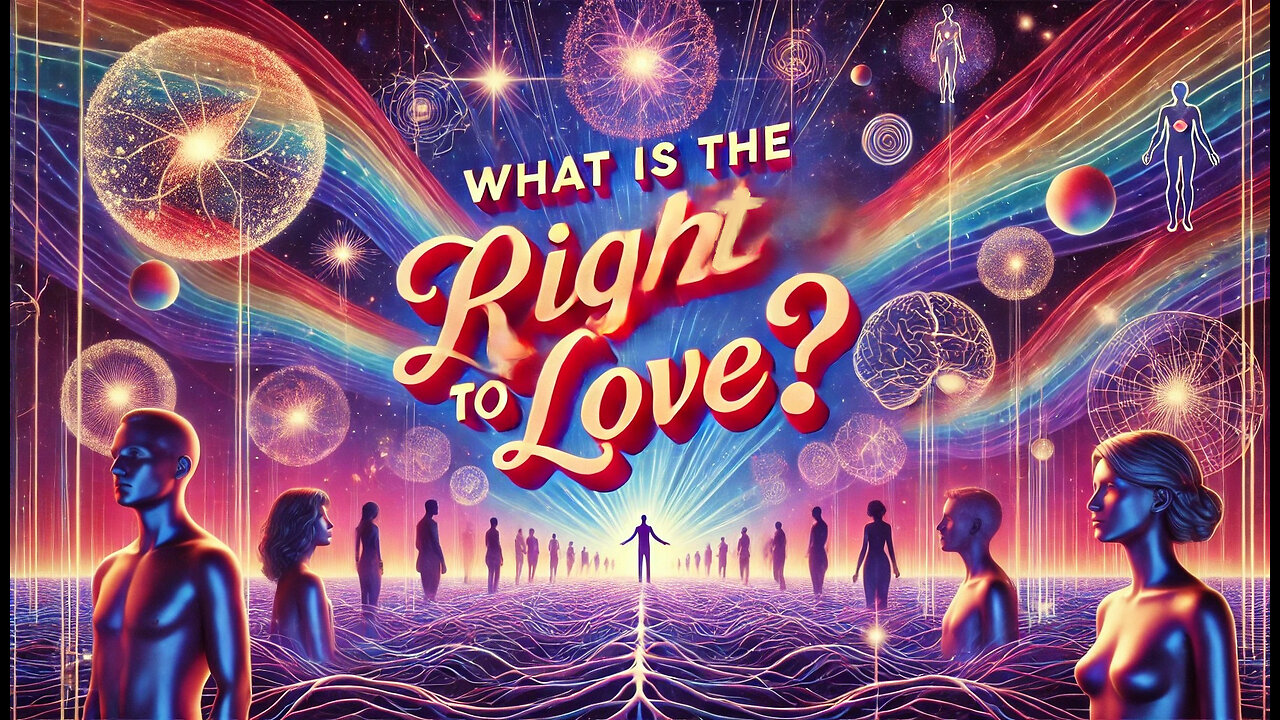Premium Only Content

What is the Fundamental Human Right?
The fundamental human right is not something granted by governments or safeguarded by laws—it is an inherent capacity rooted in the very structure of human existence. Unlike legal or social rights that can be revoked, restricted, or suppressed, this right is beyond external reach. It exists independently of political conditions, institutional recognition, or societal validation. This right is the capacity to love—a power that originates from within and cannot be forcibly given or taken away.
Love, in this context, transcends romantic or sentimental notions. It is understood as a volitional, internal freedom—the capacity to care, to value, to connect with others authentically. This capacity remains intact even in the harshest conditions: under oppression, in isolation, or in silence. It arises spontaneously from within, is chosen through attention and care, and endures through intentional devotion. This inner ability is neither granted nor revocable—it is ontological, meaning it is part of what it means to be human.
This right to love also serves as a profound mode of knowledge. While thinking allows us to analyze and measure, and valuing helps us care, love uniquely integrates both—it is participatory rather than observational. To love is to engage with the world in a way that brings meaning, depth, and presence. It is not an abstraction but a lived, emotional, and cognitive experience that resists reduction to biology or behaviorism. Love cannot be fully explained or replicated by any system because it is irreducibly subjective and deeply personal.
To determine which rights are truly fundamental, we can apply a minimalist ontological standard: if a right can be removed or must be enforced by external systems, it is contingent. But if it exists regardless of context, is unreachable by coercion, and cannot be meaningfully denied, it is foundational. By this measure, many widely recognized rights—though important—are conditional. The right to love, however, emerges as inalienable. It is not dependent on circumstances, legal protections, or social norms.
Critics might argue that love is unstable, that it can be harmful or misdirected. But these complexities do not negate its foundational nature—they reveal its depth. True love carries risks precisely because it is free. It can be distorted or misused, but that possibility affirms its authenticity. Love, when expressed responsibly and courageously, becomes a radical act of freedom—a source of strength, clarity, and resistance in the face of dehumanization.
This framework affirms that love is not merely a right to be protected—it is a power to be recognized and lived. It defines human dignity at its core. To love is to resist objectification, to assert one's irreducible subjectivity, and to reclaim the meaning of freedom from within. The ability to love confirms that you are more than a body, a role, or a data point. You are a sovereign being, capable of meaning-making in a way that no force can fully erase.
Ultimately, living from this truth means grounding one’s life in inner sovereignty. It means recognizing that the most profound form of freedom is not what is granted by the world, but what emerges from the heart. To love is to affirm your own humanity and to see that same humanity in others. This is the bedrock of all meaningful rights, the origin of personal resilience, and the birthplace of authentic liberation. The right to love is not one among many—it is the root from which all others grow.
-
 2:21:10
2:21:10
Badlands Media
9 hours agoDevolution Power Hour Ep. 386: Epstein Disclosures, Clinton Foundation, and Trump’s Wartime Authority
196K18 -
 2:07:22
2:07:22
Inverted World Live
10 hours agoGiant Asteroid Skims Past Earth Today | Ep. 102
47.1K5 -
 3:11:00
3:11:00
TimcastIRL
8 hours agoTrump Kills 11 Narco Terrorists, Democrats Warn War With Venezuela Coming | Timcast IRL
179K198 -
 13:07
13:07
Robbi On The Record
3 days ago $6.27 earnedSweet Poison: The Big Fat Lie That’s Killing America
52.1K26 -
 5:35:49
5:35:49
Drew Hernandez
12 hours agoEPSTEIN VICTIMS SPEAK OUT & TRUMP DOUBLES DOWN
46.9K37 -
 1:36:41
1:36:41
FreshandFit
8 hours agoWe Are QUITTING YouTube...
63.6K51 -
 2:34:22
2:34:22
TheSaltyCracker
8 hours agoDrug Smugglers Blown Up 9-03-25
107K214 -
 3:12:59
3:12:59
VapinGamers
7 hours ago $1.81 earnedGrim Trials - Game Review/Playthru - Rougelight Dungeon Crawler - !rumbot !music
34.4K -
 2:47:55
2:47:55
Mally_Mouse
14 hours ago🎮 Let's Play!! -- Jak 2 pt. 16
64.7K2 -
 52:23
52:23
MattMorseTV
9 hours ago $19.80 earned🔴The Cartels are SCREWED.🔴
125K135